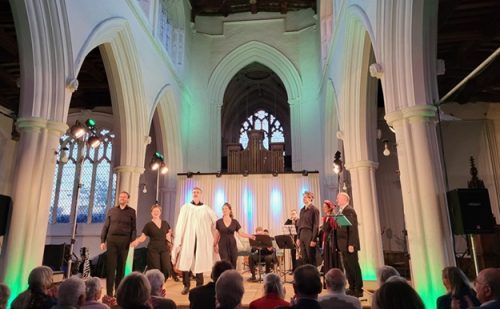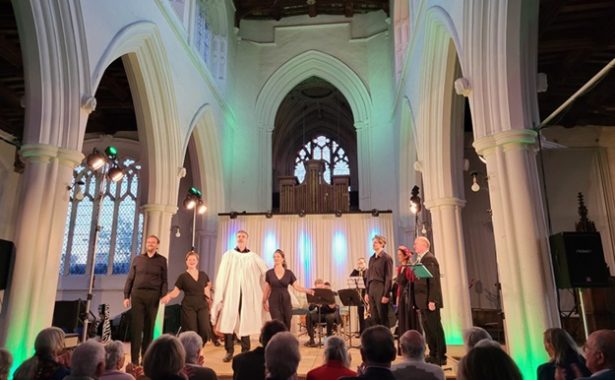 United Kingdom Thaxted Festival 2024 [3] – Purcell, The Fairy Queen, Z 629: Oz Clarke (narrator), Eloise Irving, Hannah Fraser Mackenzie, Laura Moretto (sopranos), William Towers (alto), Matthew Pochin (tenor), Robert Davies (bass), Armonico Consort & Baroque Players / Christopher Monks (harpsichord / director). Thaxted Parish Church, 6.7.2024. (CC)
United Kingdom Thaxted Festival 2024 [3] – Purcell, The Fairy Queen, Z 629: Oz Clarke (narrator), Eloise Irving, Hannah Fraser Mackenzie, Laura Moretto (sopranos), William Towers (alto), Matthew Pochin (tenor), Robert Davies (bass), Armonico Consort & Baroque Players / Christopher Monks (harpsichord / director). Thaxted Parish Church, 6.7.2024. (CC)

The Thaxted Festival continues with a rare outing for Purcell’s music for The Fairy Queen. First performed in 1692, this is a reworking of Shakespeare’s A Midsummer Night’s Dream. The author of the libretto is not known, but conjecture has it that it might be the actor and theatre manager Thomas Batterton (1635-1710).
After attending a performance of Errolyn Wallen’s Dido’s Ghost in Blackheath a few days previously (which includes a performance of Purcell’s Dido, morphing into and away from Wallen’s soundworld), it was an unalloyed delight to hear an evening of pure Purcell. The history of The Fairy Queen is a chequered one: the score was lost after its premiere at The Theatre Royal, Drury Lane. It remained hidden (despite a reward for its return!) until it was found in the library of the Royal Academy of Music centuries later, It was published only in 1903 (by The Purcell Society).The link to Thaxted is that the first modern performance of The Fairy Queen, a decade after that publication, was organised by Gustav Holst.
The decision to use a narrator was a fine one, especially as the task fell to Oz Clarke, OBE, a television personality who is known for his expertise in the field of wine. And yet prior to his fame, he was a treble at Canterbury and sang with Schola Cantorum and the Monteverdi Choir, He enjoys a long-standing relationship with the Armonico Concert; his delivery of speech was indeed positively Shakespearean, always clarion clear and brilliantly modulated (he also doubled as actor when required by the plot).
We heard William Towers’s shortened version of The Fairy Queen, but it felt nicely complete within itself, and included sequences of Night (‘See, even Night’), Mystery, Secrecy and Sleep and, later, the Four Seasons as part of the celebrations for Oberon’s birthday in the third Masque. The soloists together formed the ‘chorus’ (ending the first part of the concert – the end of Masque II – facing the audience holding tealights, vocally beautifully balanced). Talking of balance, Christopher Monks’s instrumental distribution felt just right {single strings, two trumpets, timpani, and harpsichord, with some use of the vast space of the church for trumpet dialogues, superbly played).
While the score is full of short numbers, this is definitely a case of the whole is greater than the sum of its parts, especially when one number – ‘Hush, no more’ – has the ability to stop time (superbly delivered by Robert Davies): it is answered by a ‘chorus’ and seems reminiscent, in its use of silence in between phrases, of the final chorus, ‘With dropping wings’, of Purcell’s Dido and Aeneas). Towers’s adaptation of the available material flowed nicely; the distribution between soloists works well, too. And to have three excellent (and nicely differentiated) sopranos was fine ‘casting’: Eloise Irving and Hannah Fraser Mackenzie had the biggest share. Fraser Mackenzie excelled in the gossamer-textured ‘See, even Night Herself is here’, splendidly pure of voice, expressive of line while Purcell’s heavenly counterpoint slowly unravelled below. A moment when time stopped. She was complemented throughout by Eloise Irving, whose strong, characterful soprano was every inch Fraser Mackenzie’s equal.
William Towers sang alto (and Puck) with great strength with Matthew Pochin a strong tenor. The sense of style throughout was splendid. All together, this was a short but satisfying evening – really, the church should have been full. Someone tells me there has been some football on the television, which may account for some absence. Their loss: Purcell’s timeless music triumphed in the delightful performance of The Fairy Queen by the Armonico Consort and Players.
Colin Clarke

Thank you for educating us….